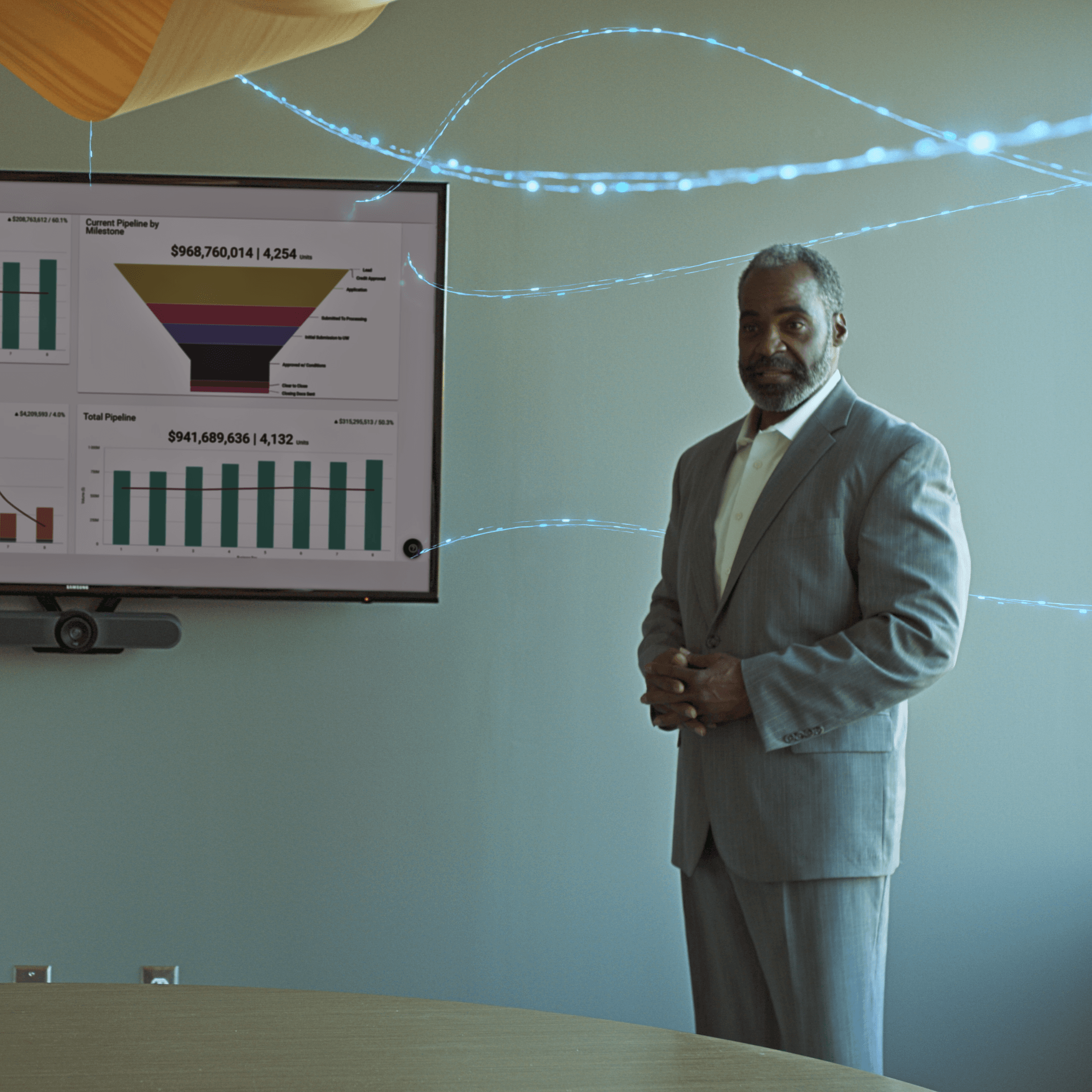
Why Seeing Intelligent Automation in Action Changes Everything

You’ve read the case studies. You’ve attended the webinars. You’ve heard the promises. Yet, despite recognizing automation's transformative potential, you remain stuck in extended evaluation cycles, unable to move from pilot programs to meaningful implementation.
The disconnect isn't about understanding the technology—it's about confidence. While 87% of financial institution leaders acknowledge intelligent automation could transform their operations, only 32% have successfully advanced beyond pilots.
When decision-makers see their complex commercial loan process flow seamlessly from inquiry through credit analysis to portfolio management—with every compliance checkpoint intact—conversations shift dramatically. The question transforms from "Could this work for us?" to "When can we implement?"
Why Extended Evaluations Fail
Information Without Application Creates Hesitation
You’ve consumed enough research to fill a library, yet you remain frozen at the decision point. The disconnect is simple: theoretical benefits don't build the confidence needed for enterprise investment decisions.
Think about how abstract terms like "process orchestration" land in the boardroom. Your executives understand the concept, but they can't envision how it handles your institution's specific complexity. They wonder about edge cases, exception scenarios, and the thousand small details that make your operations unique. Without seeing these specifics addressed, even the most compelling case studies feel like someone else's success story.
Unanswered Risk Questions Extend Timelines Indefinitely
Risk committees raise legitimate concerns that presentations simply can't address with sufficient specificity. Will the system meet our unique regulatory requirements? Can it truly integrate with our 15-year-old core banking system? How does it handle exceptions—those complex scenarios that represent 20% of our volume but 80% of our headaches? What controls remain when processes are automated?
Case studies can’t answer these questions. You need to see the platform handle real scenarios with observable audit trails, compliance checks, and exception handling protocols in action.
Limited Pilots Mislead About Transformation Potential
Here's what happens too often: institutions deploy a chatbot or implement basic RPA for a single process, then declare they're "testing automation." But these narrow applications prove almost nothing about enterprise capability. A chatbot handling account inquiries doesn't demonstrate complex commercial lending automation. Simple RPA moving data between systems won't reveal how intelligent automation orchestrates multi-party treasury workflows.
The result? Limited experiments that reinforce hesitation instead of building confidence. Your stakeholders remain unconvinced about scaling beyond basic use cases because they've never actually seen enterprise transformation—just isolated tools solving isolated problems.
What Live Demonstrations Reveal
Complete Workflow Integration Across Banking Complexity
Seeing is believing, especially when what you're seeing is your own complexity handled elegantly. Live demonstrations reveal how intelligent automation manages:
Commercial loans: From initial inquiry through sophisticated credit analysis to ongoing portfolio management. Every document captured. Every calculation transparent. Every decision point preserved.
Consumer accounts: Digital account opening with real-time KYC verification, instant fraud checks, and automatic product recommendations based on customer profiles—all while maintaining compliance standards.
Mortgages: Automated document collection, instant validation of regulatory disclosures, and intelligent routing based on loan complexity—cutting days from origination timelines.
Treasury services: Centralized workflows across departments, eliminating manual handoffs between teams and providing real-time visibility into cash positions and transaction status.
Risk assessments: Dynamic updates as portfolio data changes, powered by advanced data and analytics that enable automated stress testing, concentration analysis, and regulatory reporting that adapts to new requirements.
This isn't a series of disconnected tools—it's an integrated ecosystem where data flows seamlessly between functions, departments, and systems.
Integration Transparency That Addresses IT Concerns
Your IT team has heard promises before. They've seen "seamless integration" turn into months of custom coding. That skepticism evaporates when they observe:
Real-time core system synchronization without data duplication
API connections that respect existing security permissions and data governance
Document management integration with full audit trails
Automated reporting that feeds existing dashboards and regulatory submissions
The common IT objection—"Our systems are too complex for this to work"—completely dissolves when teams see their actual architecture integrated and operational. No theories, no promises, just proof that automation works within your technical reality.
ROI Visualization Through Observable Process Improvements
Numbers on a slide are one thing. Watching those numbers become reality is transformative. Live demonstrations show exactly how automation creates capacity without adding headcount:
Commercial loan applications processed in hours instead of weeks
Account opening completed in minutes rather than requiring multiple branch visits
Compliance reviews that happen instantly instead of delaying approvals
Customer inquiries resolved during the first interaction rather than requiring callbacks
This efficiency translates directly to revenue. Your commercial lending team can handle twice the volume with the same staff. Your retail team can onboard customers while they're still engaged. That's competitive advantage made visible through comprehensive operations analytics.
Exception Handling That Proves Sophistication
Intelligent automation separates itself from simple tools, handling the complex, unusual, and unexpected scenarios that constitute real banking operations. During demonstrations, you'll observe how the platform:
Triggers targeted document requests when information is missing while continuing to process available data
Routes complex credit structures to specialized underwriters automatically based on predefined criteria
Flags regulatory anomalies immediately while allowing standard transactions to flow forward
Maintains human oversight at critical decision points without creating bottlenecks
Generates comprehensive audit trails that exceed examination requirements
Every exception handled smoothly is another confidence builder. When stakeholders see the system gracefully manage scenarios that typically derail operations, they understand this isn't basic automation—it's intelligent transformation designed for banking complexity.
What Demonstrations Transform
Stakeholder Alignment Through Shared Observation
When your entire leadership team observes identical scenarios, something powerful happens: alignment. Instead of each department interpreting abstract concepts through their own lens, your whole team sees the same operational reality.
Your CEO focuses on competitive positioning through faster service delivery. Your Chief Risk Officer observes enhanced oversight with maintained regulatory standards. Your CIO sees technical feasibility with clear integration requirements. Your COO envisions workforce evolution from processing to relationship building.
This shared experience eliminates the interpretation gaps that limit traditional evaluation processes. When everyone watches the same loan move from application to funding in real-time, there's no room for miscommunication about capabilities or concerns.
Risk Mitigation Becomes Observable
Risk concerns transform from abstract worries to manageable realities when you observe:
Human-in-the-loop controls maintaining oversight at every critical decision point
Comprehensive audit trails capturing every action, decision, and data point
Role-based permissions ensuring only authorized users access sensitive functions
Real-time fraud detection flagging suspicious patterns while legitimate transactions proceed
Automated compliance checks validating every transaction against current regulations
Seeing these safeguards operate in real time shifts risk from an implementation barrier to a managed component. Your risk team stops asking "What if something goes wrong?" and starts planning how to optimize these controls for your specific needs.
The Acceleration Effect
Institutions compress their evaluation timelines after experiencing comprehensive platform demonstrations. What typically takes 12-18 months of analysis, pilot programs, and committee reviews often shortens to 3-4 months when stakeholders witness the platform's capabilities firsthand.
The difference is certainty. When automation handles your specific use cases, answers your particular compliance requirements, and integrates with your actual systems, speculation ends. The conversation transforms from "Should we pursue intelligent automation?" to "How quickly can we implement?"
From Proof to Performance
The impact of seeing automation in action extends beyond the demonstration room. Institutions using the nCino Platform report measurable outcomes that validate what stakeholders observed:
These aren't industry averages or best-case scenarios. These are insights from institutions that moved beyond evaluation to implementation—institutions that stopped studying automation and started experiencing it.
Marc Yrsha, Executive Vice President at Arrow Financial, captures the transformation perfectly: "With a partner like nCino, we have tools to streamline our internal processes to work swiftly and meet customers' expectations."
From Evaluation to Implementation: The Clear Next Step
You don't need more information about intelligent automation—you need confidence that it will work within your unique operational reality. Live platform demonstrations bridge this critical gap by transforming abstract capabilities into observable solutions.
Leading institutions aren't waiting for perfect certainty. They're choosing partners who can prove their capabilities before contracts are signed. The question isn't whether intelligent automation can transform banking operations. The question is whether you'll see that transformation demonstrated before you commit or discover it after implementation begins.
Ready to move from evaluation to revelation? Let nCino show you exactly how intelligent automation works with your processes, your requirements, and your goals. Schedule your demo to see transformation in action.



